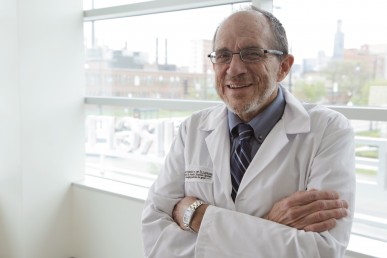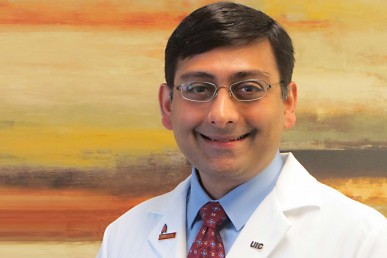UIC launches project to improve sickle cell outcomes in Chicago
The University of Illinois at Chicago has received a $4.5 million grant from the National Institutes of Health to improve outcomes for patients with sickle cell disease.
UIC is one of eight U.S. centers to receive funding as part of a National Health, Lung and Blood Institute consortium to optimize the care of young adult and adult sickle cell patients.
Collaborating with UIC and UI Health in Chicago are Sinai Health System in Chicago; the University of South Carolina in Columbia, South Carolina; the Illinois Institute of Technology’s Institute of Design in Chicago; and the University of Illinois in Peoria. UIC will lead the six-year project, called Improving Sickle Cell Care in Adolescents and Adults in Chicago (ISAAC), which will test a new approach to care for patients between 15 and 44 years of age.
Sickle cell disease is the most common genetic blood disorder in the U.S., and best practices for its treatment are well documented. However, despite the availability of high-quality care, many patients have poor outcomes.

Dr. Victor Gordeuk, director of the UI Health Sickle Cell Center and professor of medicine in the UIC College of Medicine.
Dr. Victor Gordeuk, professor of medicine in the UIC College of Medicine and one of five principal investigators on the study, says the research is not about identifying new treatments.
“It’s about ensuring patients benefit from the effective approaches to health care that we already have,” he said.
“Throughout the U.S., sickle cell patients and health care providers alike lack basic knowledge and understanding of the disease,” said Gordeuk, who is director of the UI Health Sickle Cell Center. “This leads to an absence of regular outpatient care, underutilization of beneficial medications, and inefficient pain management.
“When these critical components of care are ignored, patients needlessly suffer.”
Dr. Jerry Krishnan, professor of medicine and public health at UIC and another principal investigator on the study, says this is a result of a traditional health care system in need of redesign.
“The ISAAC program will help UI Health and Sinai Health System learn how to deliver best practices for sickle cell disease that support individuals’ personal goals for how they live, learn, work and play,” said Krishnan, who is associate vice chancellor of population health at UI Health.
Sickle cell disease primarily affects people of African descent, including approximately 1 in every 365 blacks born in the U.S.
Gordeuk and colleagues will meet with NIH program leaders and investigators from the seven other centers in the NHLBI consortium. They will enroll 450 Chicago sickle cell patients into a new ISAAC sickle cell registry and complete a comprehensive needs assessment, led by Sinai Urban Health Institute at Sinai Health System. The assessment will include input from patients, family members, patient advocate organizations, community members, public schools and community colleges, and health care institutions and professionals.
Implementation of a new care system is planned for the latter four years of the study and will include a prominent role for community health workers and a number of digital communication practices—areas in which the Sinai Urban Health Institute and the Institute of Design at IIT lend unique expertise, respectively.
“Community health workers are community residents who are hired and trained to implement health interventions in their communities. The innovative use of community health workers to manage sickle cell disease will help address many of the structural barriers and psychosocial issues that accompany this disease,” said Jana Hirschtick, an epidemiologist at Sinai Urban Health Institute.

Dr. Jerry Krishnan, associate vice chancellor of population health at UI Health and professor of medicine and public health in the UIC College of Medicine
“By merging the sciences of design and medicine, we believe we can do a better job of translating discoveries into practice,” said Krishnan, who has worked on studies of population health and care-delivery design.
Gordeuk says that finding a new approach to caring for adults and young adults will make a significant difference for patients.
“The potential of this project is to help patients have a better life and improved survival,” he said. “We want patients to have fewer visits to the emergency room, fewer admissions to the hospital, fewer complications and less pain. This is good for them, and it lowers the cost of health care.”
Patients will be enrolled through UI Health’s comprehensive sickle cell program, its network of 13 federally qualified health centers, and Sinai Health System’s two community based hospitals—Mount Sinai Hospital and Holy Cross Hospital. UI Health is the largest pediatric and adult referral sickle cell center in the Midwest. Sinai Health System includes Mount Sinai Hospital, Holy Cross Hospital, Schwab Rehabilitation Hospital, Sinai Medical Group, Sinai Community Institute and Sinai Urban Health Institute.
Dr. Lewis Hsu, director of the pediatric sickle cell program at UI Health; Abraham Wandersman, professor of psychology and expert in implementation science at USC; and, pending approval, Hirschtick, are the other principal investigators on the study.
Co-investigators from UI Health include Michael Berbaum, biostatistician for the Institute for Health Research and Policy; Dr. Joseph Colla, emergency medicine specialist; Melissa Gutierrez Kapheim, manager of research operations for the population health sciences program; Dr. Molly Martin, pediatrician and health disparities researcher; Robin Shannon, clinical instructor in the College of Nursing; and Dr. Robert Winn, associate vice chancellor for community based practice.
Co-investigators from Sinai Health System include Dr. Kishore Bobba, family medicine residency program director and medical director of palliative care, and Dr. Leslie Zun, system chair of emergency medicine. Additional co-investigators are Kim Erwin of the Institute of Design at IIT and Dr. Kay Saving, a pediatric sickle cell disease expert at the University of Illinois at Peoria.
